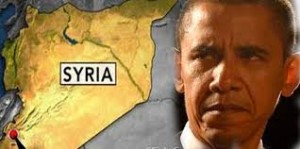 A limited strike against Syria might convince the Assad regime not to use chemical weapons again, but it won’t change the balance of power in Syria’s civil war or bring about President Obama’s stated goal of regime change, analysts and rebel leaders agree, according to an article by US Today that was published on Tuesday
A limited strike against Syria might convince the Assad regime not to use chemical weapons again, but it won’t change the balance of power in Syria’s civil war or bring about President Obama’s stated goal of regime change, analysts and rebel leaders agree, according to an article by US Today that was published on Tuesday
Syria’s President Bashar Assad has behind him Russia’s veto at the United Nations, Iran’s military backing and Lebanon’s Hezbollah’s foreign fighters , the report added.
For this reason the washington post urged Obama in an editorial titled ” military might is not enough” to do more :
“The United States can’t dictate the outcome in Syria, and it would be foolish to send ground troops in an effort to do so. But by combining military measures with training, weapons supplies and diplomacy, it could exercise considerable influence. The military measures could include destroying forces involved in chemical weapons use and elements of the Syrian air force that have been used to target civilians, as well as helping to carve out a safe zone for rebels and the civilian populations they are seeking to protect.”
“Such military action should be seen as one component of a policy that finally recognizes a U.S. interest in helping to shape Syria’s future, the WP editorial concluded.
“The threats to our interests have only gotten worse, and our inaction has been quite harmful to our interests,” USA quoted Michael Singh, managing director of the Washington Institute of Near East Policy and a former senior director for Middle East affairs at the National Security Council under President George W. Bush, as saying
“There’s no reason to think those consequences won’t continue to worsen, and yet you don’t see any momentum toward any kind of effective action by the United States and our allies to do anything about it,” he said.
Assad “has used all kinds of weapons, chemical and cluster bombs, during massacres in Syria,” said Abu Jaafar al-Mugarbel, an activist based in Homs, in western Syria.
“There is nothing that can stop the regime from doing that except military intervention. It is not the best way forward but there is nothing else after all that has happened,” he said.
Doctors Without Borders, a humanitarian group based in France, says more than 350 people were killed in an apparent chemical weapons attack. The United Nations says more than100,000 people have died in more than two years of civil war.
The rebels repeated Monday what they have been saying for more than a year: They need the United States to impose a no-fly zone over Syria to stop Assad’s planes from bombing rebel safe havens, and to strike the Syrian tanks that are shelling cities.
“First, hit military locations to stop missile attacks and air raids, which kill thousands of civilians,” said Abu Rami, a 32-year-old anti-Assad activist in Homs. “But I’m against ground intervention in Syria to avoid what happened in Iraq. It is unacceptable for all Syrians.”
Tony Badran, an analyst at the Foundation for the Defense of Democracies says what Obama does now may determine whether Assad falls. “The question is whether your intervention will have the broader goal of removal of this regime,” Badran said. “Based on how they’re talking about it … they’re defining it very narrowly, as a slap on the wrist, don’t do that again. If you do, there will be a more serious response.”
Jon Alterman, director of the Middle East program at the Center for Strategic and International Studies, said “It’s clear the administration does not intend to decisively tip the balance in favor of Syria’s insurgency.” “Everything the administration has done up to now has suggested they don’t want to own the outcome of this and their most preferable outcome is some sort of negotiated solution, ” Alterman added

Leave a Reply
You must be logged in to post a comment.